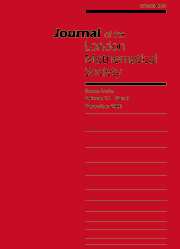ON $L^p$–$L^q$ TRACE INEQUALITIES
Published online by Cambridge University Press: 25 October 2006
Abstract
We give necessary and sufficient conditions in order that inequalities of the type
\[ \| T_K f\|_{L^q(d\mu)}\leq C \|f\|_{L^p(d\sigma)}, \quad f \in L^p(d\sigma), \]
hold for a class of integral operators $T_K f(x) = \int_{R^n} K(x,y) f(y)\,d \sigma(y)$ with nonnegative kernels, and measures $d \mu$ and $d\sigma$ on $\mathbb{R}^n$, in the case where $p>q>0$ and $p>1$.
An important model is provided by the dyadic integral operator with kernel $K_{\mathcal D}(x, y)= \sum_{Q\in{\mathcal D}} K(Q)\chi_Q(x) \chi_Q(y)$, where $\mathcal D=\{Q\}$ is the family of all dyadic cubes in $\mathbb{R}^n$, and $K(Q)$ are arbitrary nonnegative constants associated with $Q \in{\mathcal D}$.
The corresponding continuous versions are deduced from their dyadic counterparts. In particular, we show that, for the convolution operator $T_k f = k \star f$ with positive radially decreasing kernel $k(|x-y|)$, the trace inequality
\[\| T_k f\|_{L^q(d\mu)}\leq C \|f\|_{L^p(d x)}, \quad f \in L^p(dx),\]
holds if and only if ${\mathcal W}_{k}[\mu] \in L^s (d\mu)$, where $s = q(p-1)/(p-q)$. Here ${\mathcal W}_{k}[\mu]$ is a nonlinear Wolff potential defined by ${\mathcal W}_{k}[\mu](x)=\int_0^{+\infty} k(r) \bar{k}(r)^{1/(p-1)} \mu(B(x,r))^{1/(p-1)} r^{n-1} \, dr$, and $\bar{k}(r)=(1/r^n)\int_0^r k(t) t^{n-1} \, dt$. Analogous inequalities for $1\le q < p$ were characterized earlier by the authors using a different method which is not applicable when $q<1$.
- Type
- Notes and Papers
- Information
- Copyright
- The London Mathematical Society 2006
Footnotes
- 14
- Cited by




